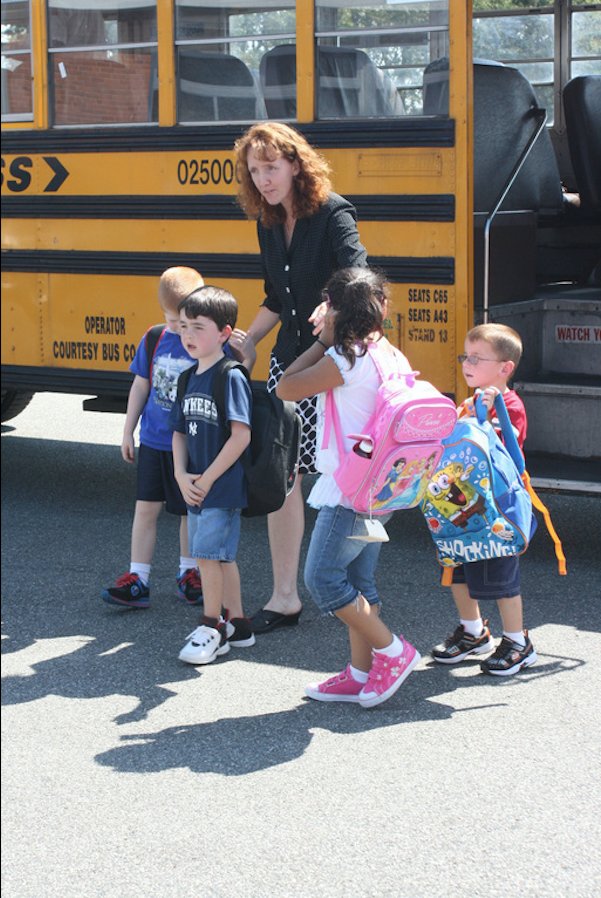Dunne is a data-minded principal
Kerry Dunne, principal of McVey Elementary School contributed to a book this past summer. “Building Community and Capacity for Data Intensive Evidence Based Decision Making in Schools and Districts,” is a result of a four-year partnership between Nassau BOCES and the Teachers College at Columbia University, according to a press release.
Dunne was one of 15 educators invited to coauthor the ebook. The work is the combination of a data collaborative led by Alex Bowers, a professor of education leadership from Columbia Teachers College, in conjunction with Nassau BOCES Instructional Data Warehouse, a repository for student data collected from multiple sources and organized for analysis and reporting. The data is collected from nearly five thousand educators, according to the press release.
“This project has helped to create a paradigm shift in the way we meet district needs,” said Meador Pratt, the Regional Information Centers director for Nassau BOCES, in a statement. “... As a result, we are more cognizant than we’ve ever been of our districts’ needs.”
The book, published in summer of 2021, was funded by a half-million-dollar grant from the National Science Foundation and is designed to help Long Island school districts create instruction. The book is aimed towards educators who want to learn how to use data to promote improvement in how instruction is taught to students. The data was collected to create a better informed “evidence-based instructional decision-making process,” the press release said.
“This really isn’t about data,” Bowers said during his keynote address at the official NSF grant project launch. “It’s about relationships and making connections. The numbers come second.”
Dunne has been using data at McVey since she started as principal 13 years ago and she said it has caused the school to come a long way.
“McVey somewhat defies the data,” Dunne said. “We’re not a high wealth area but yet our students perform as well as or better than high wealth districts.”
According to Niche.com, a ranking and reviewing site, McVey ranked number 31 out of 2,459 elementary schools in New York.
She first got involved in this project in Dec. 2019 when she was invited by Nassau BOCES as one of the top “data-minded” educators on Long Island to go to an NSF education data analytics collaborative workshop at the Columbia Teachers College in Manhattan. She was familiar with Nassau BOCES because she has taught data training there for about five years.
The event was a two-day workshop where other data-minded educators got together and tried to understand the needs of educators and education data and then together build prototypes of how educators could use the data they receive.
“The thing is that data is readily available but it’s really hard to use,” Dunne said. “How do you use it, what does it tell you and how quickly can you find out what it tells you because if you find out too late you’re already past the point that you can use it.”
Her chapter in the book talks about how she uses data at McVey. Her chapter is number 20.
“I really believe that our approach to using data and the way in which we consume it and apply it has made a tremendous difference,” she said. “How our children are prepared when they leave us to go to middle school is very important.”
The data she is referring to is state test results, geographic data, attendance, demographics, student feedback, unit assessments, entry tickets and exit tickets, which are tests students will take at the beginning and end of lesson to see what they retained.
“Community members should be able to look at the data and see how their school is doing compared to other schools,” she said. “For me as the principal it helps me see how we’re doing.”
She said that the data helps her see if the curriculum is where it needs to be, if their teaching strategies are effective and if the students are retaining what they’re learning.
“Our approach is to let the children speak to us about their learning as much as possible,” she said. “The only way for them to let us know how they’re doing is through our ability to take the information they give us, understand what it’s saying to us about their learning and then apply it to our plan for the next learning session.”
Dunne said that at McVey the teachers and she do a lot of formative assessments to see if the children are consuming what they’re learning. These assessments include the entry and exit exams and learning checkpoints. She said that they then get together and discuss the data collected from these assessments to try to come up with ways to better the learning experience for the students.
“It’s a constant cycle of listening to what the children are telling us through their work and reevaluating our practice, reevaluating our instruction, reevaluating our planning to meet the children where they are,” she said. “And that’s really what data should do. It should be a constant cycle of collecting, understanding, planning and applying.”







